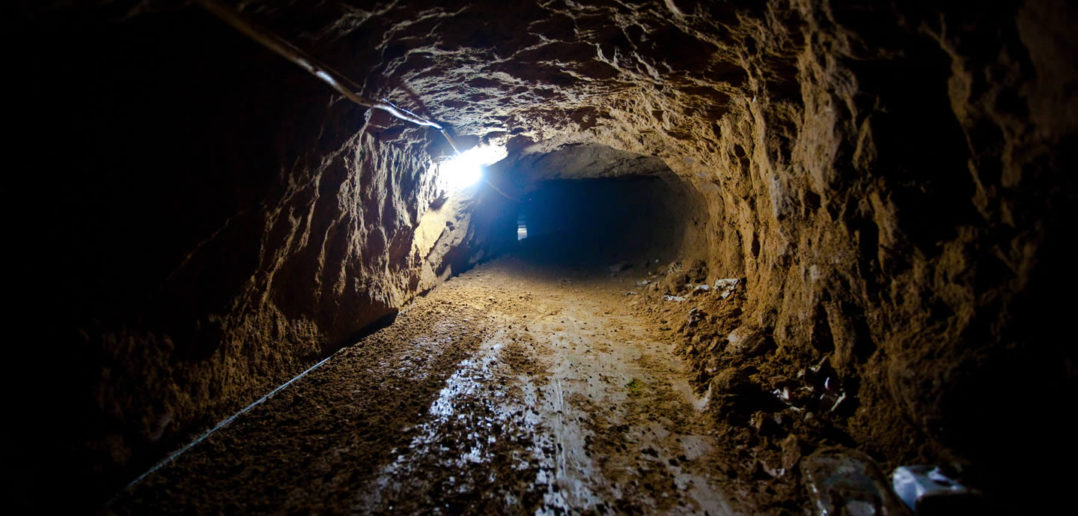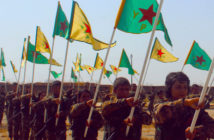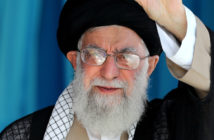Bassam, let’s pretend that’s his name. How we met is unimportant, the random exchange we had later on is what matters. It was one of those Saturday night outs in Beirut, where the evening hustle and bustle can sometimes hide a deeper parallel dimension under its shallow guise. Bassam had just gotten back from a visit to see some relatives, as his “family gatherings” and “chats with my nephew” indicated all too often in the conversation. “My nephew has never left Gaza,” Bassam explained, “so I am the only real connection he has to the outside world, or rather, to the real world outside the prison in which he is forced to live in.” This time around, however, Bassam was on a mission. “Our chat came soon after my nephew was approached by Hamas recruiters, hoping to enlist him at a young age. My brother panicked at the mere encounter and didn’t know what to do, so he thought it would be a good idea for me to intervene, before it was too late.”
“Did you say Gaza?” I asked perplexed. That Hamas would try to lure youngsters was unfortunate but not unexpected. The fact that Bassam had been to Gaza, given the near impossibility of going to the Occupied Territories from Beirut, let alone Gaza, was what stuck with me the most.
“Yes,” Bassam nodded.
“But how?” I asked.
“Through a tunnel,” Bassam answered matter-of-factly, with a wide smile brightening his face, enough to get my imagination running wild.
It took over a year to finally get the chance to sit down with Bassam and hear his entire story. In the meantime, I never forgot about the tunnel. I knew it wasn’t going to be the stuff of Hollywood movies, after all, Bassam had been to Gaza, and there certainly is no happy ending there. Yet, there was something that fascinated me about it, of how something so primitive was still used in our fast-paced, technologically-sophisticated times. On the practical level, I wanted to know how it actually worked, why Egypt and Israel would turn a blind eye underground when they held so tight to their siege of Gaza above the ground. I wanted to hear about the feeling for someone to go to Gaza and leave, knowing that the rest couldn’t, trapped in their own homeland. I wanted to get a glimpse of what life in Gaza was really like, lamenting how Palestine was so close to many of us yet remained so far away. But when I finally met Bassam, all I wanted to hear about was the tunnel.
“All I know is that I will never take a legal route to go into Gaza ever again,” Bassam began, in reference to the above ground Rafah border crossing between Egypt and Gaza.
“Why?” I asked.
“Going through Rafah is dehumanizing. It is humiliating. I will never take it to go to Gaza, ever,” he repeated, banging his hand on the coffee table. “Going the way I did, without visas, without barriers and in no time is simply….liberating.”
Bassam passionately told me how it felt for an 18-hour journey from Egypt to Gaza using the official crossing to become a 5-minute commute through a tunnel. He likened the above ground journey to Gaza to going from Beirut to Tripoli (north Lebanon) via Istanbul. He pointed at the incredible irony that such a long journey above ground wasn’t because of long distance itself, but solely because of man-made barriers, stripping people of their most basic human right of freedom of movement in the process. Thinking it would be easier to understand, Bassam started drawing diagrams on a napkin on the table between us. By the time we had finished, there were maps, timetables and arrows in all directions of each of the eight rectangles upon which the napkin was folded onto. Bassam wanted to put his journey in proper context, so he drew how Palestine looked like in 1948 and how it slowly started shrinking thereafter. The way Palestine – now the West Bank and Gaza – had been effectively detached from one another. How Gaza’s population was around 100,000 in 1948, while the world’s biggest prison (35 kilometers long by 8 kilometers wide) currently holds around 2.3 million people behind its invisible bars. He digressed, but I felt he needed to emphasize these details, if only to underline the absurdity of what had become of Palestine today.
“So how does it actually happen?” I interrupted, “how do you go to the Egyptian border, get into a tunnel and end up in Gaza a couple minutes later?”
A network of tunnels between Egypt and Gaza has existed for years. Given that the Israeli blockade tries to keep weapons from getting into Gaza, along with a countless number of other goods, and a lot of them with no justification whatsoever, tunnels have remained the only means by which to obtain a myriad of goods. Similarly to the existence of tunnels to transport steel and rocks for reconstruction, for example, there was a tunnel for the movement of people.
“So this is what happens,” Bassam explained, “I take the 6 p.m. Middle East Airlines flight to Cairo. Due to the time difference, I also reach Cairo at 6 p.m. From there, I take a taxi to Rafah, a prearranged drive with a local Bedouin given the precarious security situation in the Sinai. This drive usually takes around 4 hours. Once we get to the border, I enter a designated house, through which I access the tunnel. There are tunnels you walk into, whereby a natural slope takes you down, after you which you walk straight ahead and walk back up. Others can be accessed through a winding staircase, after which you walk straight and go back up using a staircase and unto higher ground. Either way, I walk through it all the way to Gaza. Once I get out of the tunnel, I find myself in yet another house, this time in Gaza. It is a house, yet I am greeted by Gaza government officials who duly check my papers. At 10:30, I’m on the dinner table with my family.” I asked Bassam why would the Israelis turn a blind eye toward tunnels they must surely know of, transporting goods to Gaza in defiance of their blockade and facilitating the movement of a select number of people like him. “It is part of the humiliation,” he said, using that same oppressive term again.
I was speechless, taken back by a simple story that was fascinating for all the wrong reasons, and a simple reflection of all the injustice to which one people had been subjected to for years. It is only until I had a clear picture of how Bassam had physically gone through his underground journey, that I understood why it had taken him so long to explain the mechanics of it to me. It is only then that I understood why he used the word “humiliating” as often as he banged his hand on the table in subdued outrage and desperation. It was because it wasn’t about the drive to Sinai, the form of the tunnel, the type of stairs nor the house he came out of in Gaza. This was about the tragic state in which Palestine found itself and consequently, that of the Arab world as a whole.
“What did we do to ourselves?” Bassam had asked towards the end of our conversation. As I went back home, struggling to figure out how to make sense of this conversation, this question kept coming back to me. In retrospect, I realized it was the question underlying the entire conversation all along.
‘What did we do to ourselves?’ was the question at the core of Bassam’s journey, in other words, how did we allow so much injustice and division unto us for all these years? The physical barriers erected between Palestine and the rest of the world are prohibitive enough to keep people apart, “you don’t feel this division until you experience it.” However, they are nothing compared to the psychological barriers they consequently reinforced, or “isolation by design,” as Bassam termed it. “We have become numb,” Bassam said, “to the division, all of which feeds our lack of awareness to the conflicts and suffering around us.”
But there was a silver lining that Bassam wanted to highlight among all the hopelessness he felt. Implicitly, he humbly wanted to shed light on his labor of love towards his nephew and especially this time around, after the Hamas recruiters tried their luck with him but failed. To Bassam, being his nephew’s eyes unto the world beyond Gaza, talking to him about everything from teenage mood swings to the importance of an education, making him realize there was an alternative reality to the violence his nephew saw on a daily basis was his way of effectively breaking the siege of Gaza, in defiance of Israel and the whole world. Explicitly, it was still about the siege, but seen from a different perspective. “In spite of it all, it is only by experiencing and feeling the humiliation any kind barriers bring, that we truly comprehend that they exist, and with it, the realization that breaking them is easier that we think.”
Still, to Bassam, the future of Palestine, and that of the region, remain bleak. “Palestine has become the best metaphor for the other two biggest tragedies of the region, Syria and Iraq,” he said. “If you want to know what will happen to them, look at us, look at Palestine.”
As I imagined what other stories Bassam could share the next time I saw him, which would hopefully be after yet another journey to Gaza, I remembered one small detail. Bassam had mentioned that he would never go to Gaza through an official border crossing again, but now there were no more tunnels. As part of Egyptian President Abdel Fattah el-Sisi’s campaign to destroy the tunnels to counter weapons smuggling, the Sinai area was flooded about a year ago, effectively destroying all the tunnels. I didn’t have the chance to ask Bassam what he would do now, but if anything, I think I could quite accurately deduce my answer from our conversation.
At the end, I had gotten my story of the tunnel and much more with it. The story of Gaza and Palestine, all of which Bassam expressed not so much by way of his eloquence but with his bare emotions – ranging from shy optimism to raw desperation, anger, despair and hopelessness. And maybe that’s because I saw the tunnel, and Bassam saw, and pushed me to see, the darkness that still shined at the end of it.







